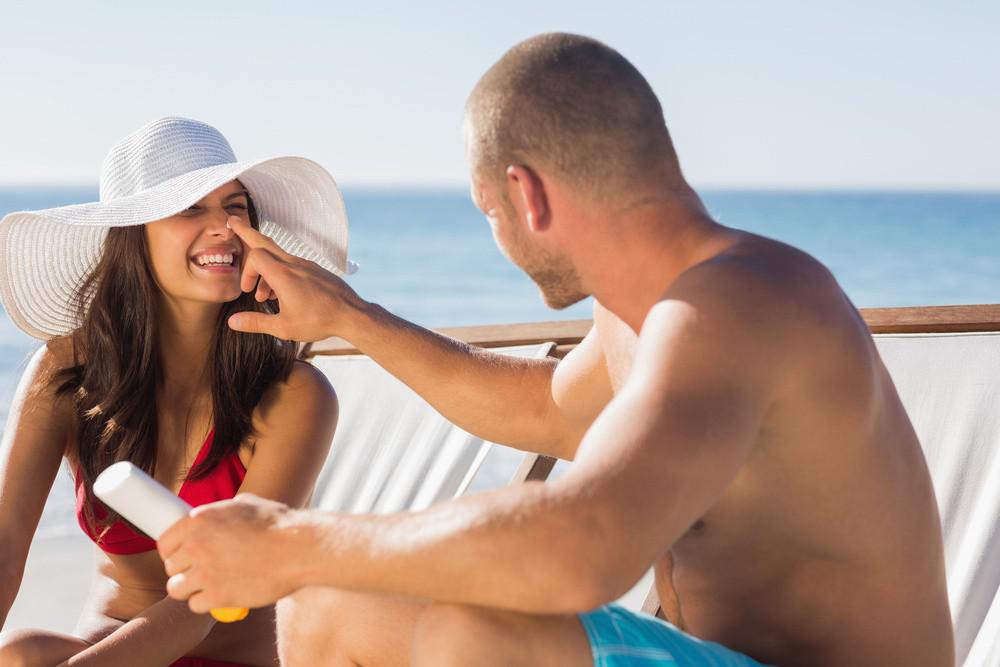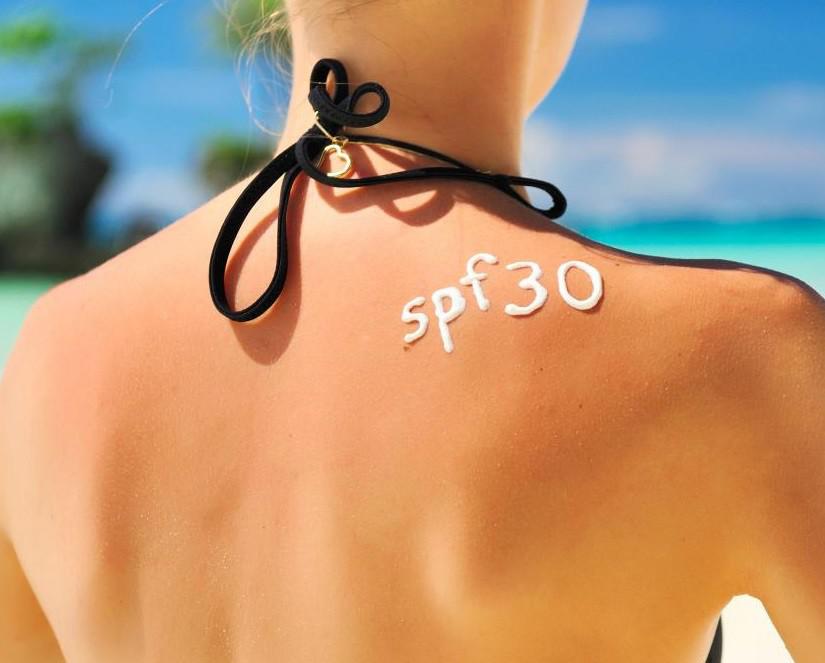
One of the main lines of defence against developing skin cancer is protecting the skin from the harmful rays of the sun by using an SPF (sun protection factor) product every day. Our skin is exposed to the sun’s UV rays (UVA and UVB – there is also a UVC but this mostly burns off in the atmosphere and doesn’t pose a problem) all year round, no matter where we are. That means being sun smart and using SPF is as important here in Ireland, where it tends to be overcast, as it is when you go on holiday to sunnier climates.
UV rays penetrate the skin and as well as being responsible for many of the signs of ageing like wrinkles and pigmentation, they can also lead to the development of skin cancers such as melanoma, basal cell carcinoma or squamous cell carcinoma. Even on overcast days in cooler climates, skin is hit with UV rays, which can also penetrate glass (something to bear in mind if you sit by a window at work or at home).
In warmer climates or on holidays, when you usually have more skin exposed and for longer, skin is even more at risk, so being aware of the dangers of sun exposure and taking steps to protect your skin are essential.
Using a good quality SPF product every day protects skin from these UV rays but you need to make sure you are using a reliable product and that you are also using it properly. (We’ve all experienced those blotches of sunburn on bits of skin that remained exposed due to sloppy sun cream application!). Proper application is very important to protect the skin and this is sometimes that is often overlooked.
Look for a broad-spectrum SPF or sunscreen product that will offer protection against both UVA and UVB rays. Always buy from a reputable brand; speak to a pharmacist if you are unsure which products would best suit your needs.
Keep in mind when or where you will be using it. For example, formulations are always improving and it is now possible to get waterproof, sweat-proof and even sand-proof sun creams that are particularly good for beach or outdoor holidays.
For casual exposure day to day in an average climate, sun cream or a daily moisturiser containing an SPF15 or SPF30 is usually sufficient. In warmer months or sunnier climates, you’ll need to switch to a sun care product with an SPF rating of at least SPF30. This also applies here in Ireland, if you work outside or spend a lot of time outdoors.

For proper coverage and protection, you need to make sure that you’ve applied a sufficient amount of product and in the correct manner. You will need more than you might think. Typically, an adult will need 35mls of product to cover the whole body. A further tablespoon worth of sun cream should be used to cover the face and neck.
Keep an eye on ‘use by’ dates on the packaging, and don’t keep last year’s SPFs for this summer. As with any other perishable, sun protection products do go out of date, which means that after that date they will no longer work to effectively protect skin, and if you are using sufficient amounts of products and reapplying often, a bottle shouldn’t last a very long time. Sun cream is not something to scrimp on.
The sun gives us vital vitamins that are important for our health, but it also brings us a real risk of skin damage that can lead to the development of skin cancer, so stay sun smart and protect yourself properly so you can safely enjoy being out and about.
If you are concerned about your skin or that of a loved one, arrange a consultation with me at my clinic, and, because being sun smart is important in reducing the risk of skin damage from UV rays, download my free guide to sun protection:
Download Mr Chan's Guide to Proper Sunscreen Use

One of the main lines of defence against developing skin cancer is protecting the skin from the harmful rays of the sun by using an SPF (sun protection factor) product every day. Our skin is exposed to the sun’s UV rays (UVA and UVB – there is also a UVC but this mostly burns off in the atmosphere and doesn’t pose a problem) all year round, no matter where we are. That means being sun smart and using SPF is as important here in Ireland, where it tends to be overcast, as it is when you go on holiday to sunnier climates.
UV rays penetrate the skin and as well as being responsible for many of the signs of ageing like wrinkles and pigmentation, they can also lead to the development of skin cancers such as melanoma, basal cell carcinoma or squamous cell carcinoma. Even on overcast days in cooler climates, skin is hit with UV rays, which can also penetrate glass (something to bear in mind if you sit by a window at work or at home).
In warmer climates or on holidays, when you usually have more skin exposed and for longer, skin is even more at risk, so being aware of the dangers of sun exposure and taking steps to protect your skin are essential.
Using a good quality SPF product every day protects skin from these UV rays but you need to make sure you are using a reliable product and that you are also using it properly. (We’ve all experienced those blotches of sunburn on bits of skin that remained exposed due to sloppy sun cream application!). Proper application is very important to protect the skin and this is sometimes that is often overlooked.
Look for a broad-spectrum SPF or sunscreen product that will offer protection against both UVA and UVB rays. Always buy from a reputable brand; speak to a pharmacist if you are unsure which products would best suit your needs.
Keep in mind when or where you will be using it. For example, formulations are always improving and it is now possible to get waterproof, sweat-proof and even sand-proof sun creams that are particularly good for beach or outdoor holidays.
For casual exposure day to day in an average climate, sun cream or a daily moisturiser containing an SPF15 or SPF30 is usually sufficient. In warmer months or sunnier climates, you’ll need to switch to a sun care product with an SPF rating of at least SPF30. This also applies here in Ireland, if you work outside or spend a lot of time outdoors.

For proper coverage and protection, you need to make sure that you’ve applied a sufficient amount of product and in the correct manner. You will need more than you might think. Typically, an adult will need 35mls of product to cover the whole body. A further tablespoon worth of sun cream should be used to cover the face and neck.
Keep an eye on ‘use by’ dates on the packaging, and don’t keep last year’s SPFs for this summer. As with any other perishable, sun protection products do go out of date, which means that after that date they will no longer work to effectively protect skin, and if you are using sufficient amounts of products and reapplying often, a bottle shouldn’t last a very long time. Sun cream is not something to scrimp on.
The sun gives us vital vitamins that are important for our health, but it also brings us a real risk of skin damage that can lead to the development of skin cancer, so stay sun smart and protect yourself properly so you can safely enjoy being out and about.
If you are concerned about your skin or that of a loved one, arrange a consultation with me at my clinic, and, because being sun smart is important in reducing the risk of skin damage from UV rays, download my free guide to sun protection:
Download Mr Chan's Guide to Proper Sunscreen Use